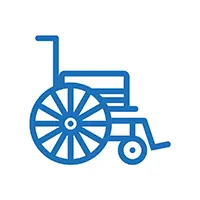Video details
Video title: Living without barriers
Video duration: 4:41
Page(s) this video appears on:
Video transcript
[Music playing]
[Music volume fades to background level]
John: Get out there and live life to the fullest. That’s my motto.
[Music volume rises]
John Marrable doesn’t let his paraplegia limit him.
He has a black belt (6th dan) in Goju Ryu karate and he teaches it from his wheelchair.
[Music volume fades to background level]
John: Never give up really. That’s one of our, um… the mottos of our karate club, the last thing is never give up. And I think that’s the easiest thing, um, and that’s where your brain, your mind comes in. It’s so easy to stop because things get hard but if you push through that barrier you can achieve so much.
[Music volume rises]
John runs a karate club in Dunedin and is an accredited barrier-free advisor.
[Music volume fades out]
John: I don't kick, of course, um… well I do but people just don't see it, it's that fast… As I say to people, you've never blocked one of my kicks, you never will. When people are doing kicks I just carry on punching, so um, we might do 500 kicks and then 500 punches so I end up doing 1000 punches.
John: We do patterns, so I try to get my wheelchair moving the same as someone would walk or move… you turn to the left, I turn to the left, you turn 360, I turn 360. We do have a form where there's a jumping kick but I don't do that, I may do a wheelie, spin round and... I try and emulate what people are doing. So if they kick I'll do a hand technique instead. Um, when I fight people, they've got the advantage that they only need to watch my hands or if I'm using my wheelchair, just one hand, 'cause my hands will drop.
[Music playing]
John: Up til the age of 10 years, 10 months and two days I ran around, I was just like any other kid ah, we were on holiday in Scotland and my parents told my brother and I not to go near this cliff. So like, ah- really good boys we decided we'd try and climb it, and unfortunately, when I was on the way down, the cliff gave way. Ended up breaking my back and spending nine months in Stoke Mandeville Hospital.
John: In those days that was like the, um, number one spinal unit in the world and I was there for nine months, and really feel that those nine months, when I left I was really well rehabilitated to, ah, spend the rest of my life, um, pushing myself around in a wheelchair.
[Music fades out]
John: I came out from New Zealand in... sorry from England to New Zealand in '74 and, ah took up paraplegic sport over here I'd been doing some in England and then in '76 started doing karate found a club that would teach me, and I've been doing karate ever since.
[Music playing]
John: Teaching people, I do a lot of talking to explain so I'll tell you to have your feet shoulder-width apart, weight 60 percent on the ball of your feet, things like that or I'll have people I'll call as my stand-ins, my leg dummies or whatever and I'll get them to demonstrate a kick. Um, I think the… the buzz I get it just seeing the kids respond with me. We have about 20 kids sometimes training and it's great. They forget I'm in a wheelchair, which is really good.
John: We've only got to do 10, I want your knees over your big toe. Bend your knees.
John: Nice feedback, just watching them try and um, it's, it's, it's just something being able to empower people, giving them that skill to do things.
John: The biggest barrier's the person themselves. I've seen lots of cases where someone has been born with a disability and as they've grown, they've learnt that there's support for them and they, it's like a learned dependency on people, and people always running after them, helping them, which is good, but sometimes they've… they've disempowered them by giving them too much help. Um, I think it's good to be there but to help them, not to… not do everything for them but give them the skills to help themselves.
John: Use your body weight to generate the power. Make sense?
John: I can't think if there's anything I've wanted to do that I haven't been able to. I'll always find a way to do something… and that's the great thing. And it's having the confidence as well to ask. I know some disabled people, they sometimes don't want to ask and they will struggle whereas I think if I can give them a bit of skills they will not struggle so much, or have the confidence to ask, and again, that's where my martial arts has given me that strength of mind.
[Music volume rises]
[Music fades out]
Last updated on Friday, 1 November 2019













